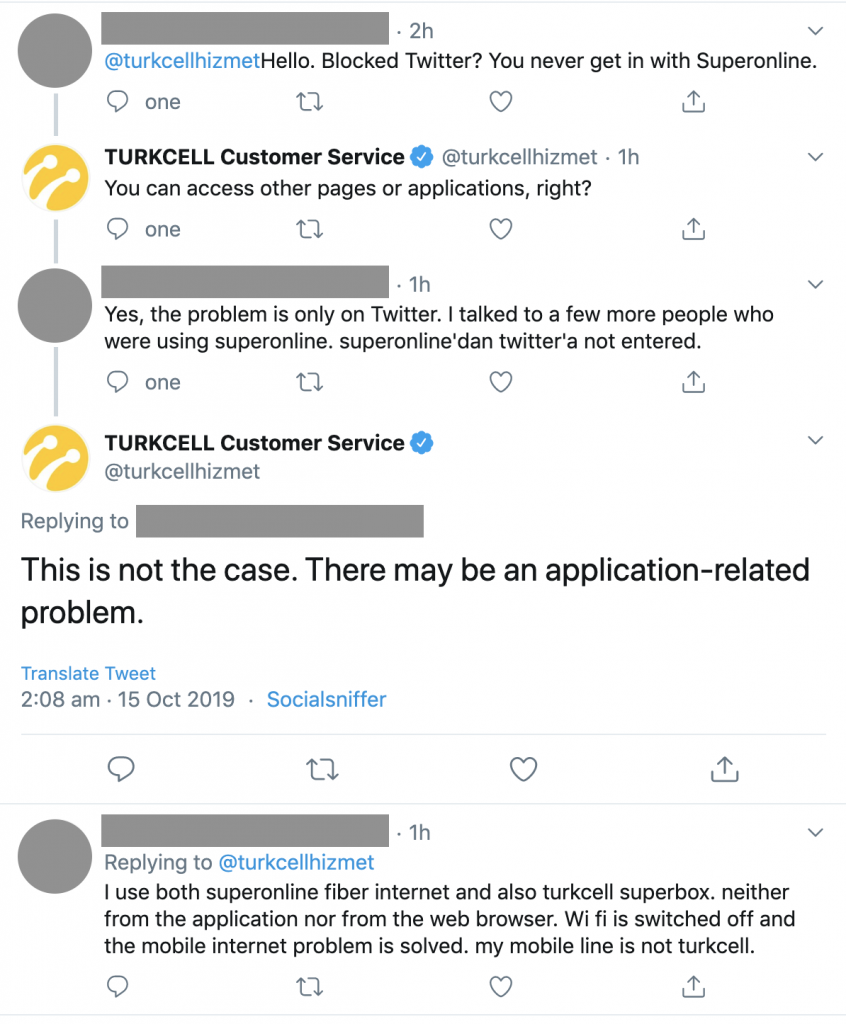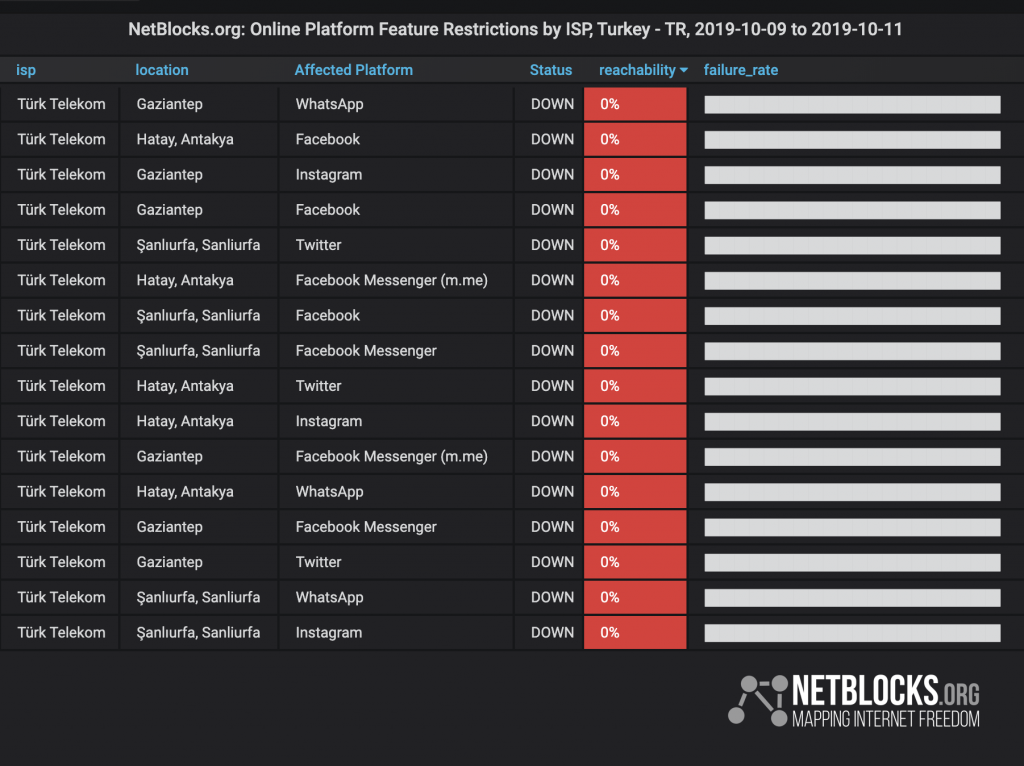Network data from the NetBlocks internet observatory confirm that Turkey has blocked access to social media and messaging platforms in the southern cities of Gaziantep, Şanlıurfa and Hatay, as the country launches military operation Peace Spring into northern Syria.
Internet performance metrics show that Twitter, Facebook, WhatsApp and Instagram are currently blocked by leading internet service provider TTNet, corroborating reports emerging from users based in in the affected region. Access remains possible via other fixed-line and mobile providers, and VPN tools are effective in circumventing the blocks.
Confirmed: Twitter, Facebook, WhatsApp and Instagram restricted in parts of southern #Turkey; real-time network data show social media now blocked in Gaziantep, Şanlıurfa and Hatay by TTNet amid #PeaceSpring military operations into northern Syria 📉
📰 https://t.co/zx4QGrE56B pic.twitter.com/jAO9YtM8vq
— NetBlocks (@netblocks) October 11, 2019
Wartime social media restrictions now in effect
The blocking measure marks the reinstatement of wartime social media restrictions, as the Turkish Armed Forces and Free Syrian Army launch an expansive incursion into northern Syria targeting PKK/YPG and IS groups in the first phase of Operation Peace Spring.
A similar measure was previously invoked during the initial phase of Operation Euphrates Shield on Thursday, 25 August 2016 when social media platforms Facebook, Twitter, YouTube, Vimeo and Instagram were blocked throughout Turkey for a period of seven hours:
Confirmed: Twitter, Facebook & YouTube blocked by throttling in #Turkey at 11:07PM – reason unknown pic.twitter.com/vEGSt0jvWU
— Turkey Blocks (@TurkeyBlocks) August 25, 2016
Why has social media been blocked in parts of southern Turkey?
Although no broadcast ban has yet been issued to the public, it is understood that the measures are intended to protect details surrounding troop and equipment deployments, particularly the sharing of photographs and videos of convoys which could compromise tactical operations.
Turkey passed an internet “killswitch” into law in 2016, permitting the ICTA regulatory authority to “partially or entirely” suspend internet access due to war or national security needs without the need for ministerial oversight:
Could #Turkey's new wartime net killswitch amendment explain mystery social media blackout?https://t.co/ZpJ6jixhsB pic.twitter.com/W2NcY2twlU
— Turkey Blocks (@TurkeyBlocks) August 26, 2016
When was the last time Turkey blocked social media?
The new restrictions are the first to be implemented since December 2016, when Turkey blocked social media nationally to prevent the sharing of a video showing the immolation of Turkish soldiers by the IS group:
Confirmed: Twitter, Facebook and YouTube blocked in #Turkey after #IS uploads soldier videohttps://t.co/xeOXVf8tP2 pic.twitter.com/XZ9kWCpiF7
— Turkey Blocks (@TurkeyBlocks) December 22, 2016
Unlike previous recorded incidents, this is the first time Turkey has imposed a sub-national social media ban, demonstrating an advance in technical capability which facilitates geographically constrained network filtering.
Updates and further incidents
Tuesday, 15 October Turkcell-Superonline Twitter disruption
On the morning of Tuesday, 15 October, Twitter was restricted nationally for a period of 40+ minutes with fixed-line network Turkcell-Superonline (formerly Tellcom).
In this instance, all other major social media platforms remained available. Twitter’s embed API was also excluded from the restrictions, allowing third-party websites such as news portals that embed tweets to function in a read-only manner.
Update: Access to Twitter restored with Turkcell-Superonline fixed-line internet provider from 3:00 a.m. UTC (6:00 a.m. local time) following 40+ minute disruption 📰 pic.twitter.com/8X2QbpPslR
— Turkey Blocks (@TurkeyBlocks) October 15, 2019
Several users reported the disruption on online forums, as well as on Twitter itself:
Turkcell Superonline'dan bir saate yakın Twitter'a erişim yoktu. Şimdi bağlanabildim.
— Sinan Gündüz (@c_n0ne) October 15, 2019
Users who filed complaints during the outage were told by technical support that the problem was with their application and not the service, despite network data showing a network-wide disruption to Twitter:

Methodology
Internet performance and service reachability are determined via NetBlocks web probe privacy-preserving analytics. Each measurement consists of latency round trip time, outage type and autonomous system number aggregated in real-time to assess service availability and latency in a given country. Network providers and locations are enumerated as vantage point pairs. The root cause of a service outage may be additionally corroborated by means of traffic analysis and manual testing as detailed in the report.
NetBlocks is an internet monitor working at the intersection of digital rights, cyber-security and internet governance. Independent and non-partisan, NetBlocks strives to deliver a fair and inclusive digital future for all.
[ press | contact ] Graphics and visualizations are provided for fair use in unaltered form reflecting the meaning and intent in which they were published, with clear credit and source attribution to NetBlocks. Intellectual property rights are protected including but not limited to key findings, facts and figures, trademarks, copyrights, and original reporting, are held by NetBlocks. Citation and source attribution are required at the point of use.

